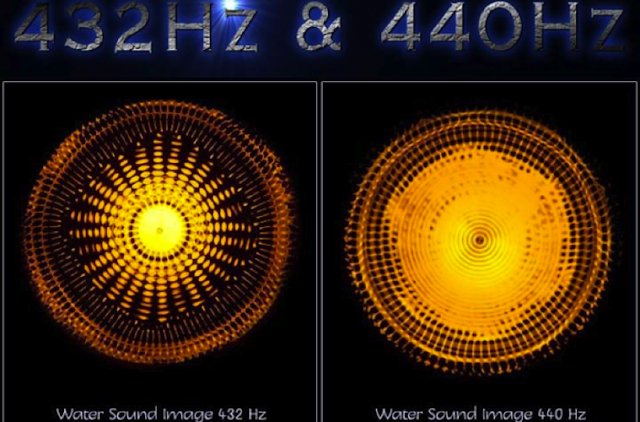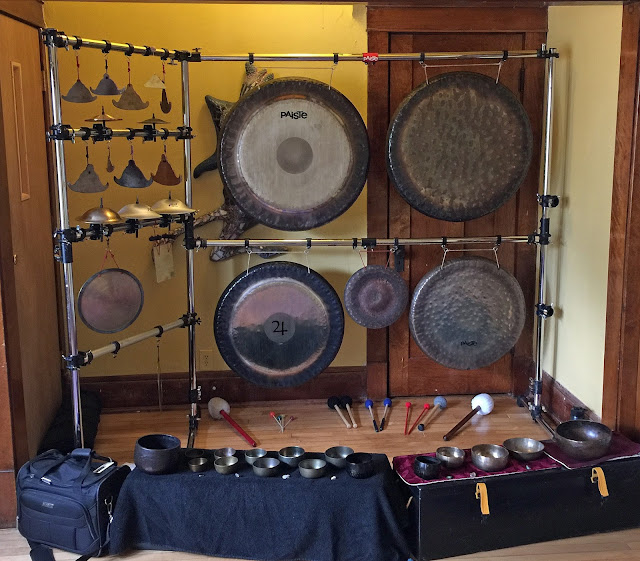Don't Forget To Make Music
I'm constantly surprised, when listening to sound healers, how much of the sounds they make I perceive as noise, or at least as non-musical sound. It's really a shame, because I think they are missing the opportunity to be so much more, and to give their listeners so much more.
Understand that my viewpoint comes from being a trained musician with over 50 years of experience. I'm all for healing/therapy/meditation, or however you want to describe what you do with your gongs/bowls/bells, but much of what I hear is lacking 3 important aspects of music—rhythm, harmony, and melody. Let's take a look at those:
1) Rhythm. To me, this seems so basic, but as a percussionist, it's so ingrained in my body/mind/soul, that I can't help but always feel a sense of rhythm in what I do. So perhaps it's from this perspective that I'm so surprised by the lack of any sort of discernible rhythm from many of the people I listen to. To me, rhythm is important because it gives the listener something to lock on to. A steady pulse, whether fast or slow, is the framework on which to build everything you do upon. When I play, I'm always thinking in rhythm, even multiple layers of rhythm. The pace of what I play may change, but there is still a rhythm to it.
2) Harmony. In the traditional sense, harmony would be multiple notes forming a chord. In the pure percussion sense, I see/hear harmony as multiple sounds forming a chord-like sense, another voice which is the combination of the multiple individual voices. In my own work, I experience this when playing 2 sounds at the same time, or multiple long sounds that ring out together, creating a blend of tones.
3) Melody. This is probably the most known, but least experienced element. Everybody sings. We sing to ourselves daily, whether in the shower, the car, at home, or even just quietly to ourselves. And what we sing is the melody of the songs we know. So we all have plenty of experience with melody.
Even if you have only 2 sounds/instruments, you can play melodies. This is one thing I stress extensively to my students. As I've walked further along the path, I've found that I long for melody. This is one reason I have added sets of bowls and bells to my set up. Each of these sets have been put together to form a melodic whole in which I can play musical lines. While not tuned to an A=442 orchestral tuning, my singing and rin bowls form a set that I can play both melodic and harmonic elements on. The same goes for my Burma bells, copper-clad bells, bell plates, and even bell cymbals, which have all been put together in melodic/harmonic sets.
Diving Deeper Into The Sounds
When I play, I'm always thinking as a musician first. I'm always thinking of rhythm, harmony, and melody. And I'm always thinking how I can use these 3 elements to relate to my listeners on an even deeper level. I would urge any sound practitioners who have no formal musical background, to take some lessons and learn an instrument. This does not mean that your goal needs to be becoming proficient enough to perform on stage, but rather, that you develop your ear and your musical skills in order to improve what you offer to the public.
Creating sounds for healing/therapy/meditation is fine, but don't forget to make music while you do so.
~ MB
Understand that my viewpoint comes from being a trained musician with over 50 years of experience. I'm all for healing/therapy/meditation, or however you want to describe what you do with your gongs/bowls/bells, but much of what I hear is lacking 3 important aspects of music—rhythm, harmony, and melody. Let's take a look at those:
1) Rhythm. To me, this seems so basic, but as a percussionist, it's so ingrained in my body/mind/soul, that I can't help but always feel a sense of rhythm in what I do. So perhaps it's from this perspective that I'm so surprised by the lack of any sort of discernible rhythm from many of the people I listen to. To me, rhythm is important because it gives the listener something to lock on to. A steady pulse, whether fast or slow, is the framework on which to build everything you do upon. When I play, I'm always thinking in rhythm, even multiple layers of rhythm. The pace of what I play may change, but there is still a rhythm to it.
2) Harmony. In the traditional sense, harmony would be multiple notes forming a chord. In the pure percussion sense, I see/hear harmony as multiple sounds forming a chord-like sense, another voice which is the combination of the multiple individual voices. In my own work, I experience this when playing 2 sounds at the same time, or multiple long sounds that ring out together, creating a blend of tones.
3) Melody. This is probably the most known, but least experienced element. Everybody sings. We sing to ourselves daily, whether in the shower, the car, at home, or even just quietly to ourselves. And what we sing is the melody of the songs we know. So we all have plenty of experience with melody.
Even if you have only 2 sounds/instruments, you can play melodies. This is one thing I stress extensively to my students. As I've walked further along the path, I've found that I long for melody. This is one reason I have added sets of bowls and bells to my set up. Each of these sets have been put together to form a melodic whole in which I can play musical lines. While not tuned to an A=442 orchestral tuning, my singing and rin bowls form a set that I can play both melodic and harmonic elements on. The same goes for my Burma bells, copper-clad bells, bell plates, and even bell cymbals, which have all been put together in melodic/harmonic sets.
Diving Deeper Into The Sounds
When I play, I'm always thinking as a musician first. I'm always thinking of rhythm, harmony, and melody. And I'm always thinking how I can use these 3 elements to relate to my listeners on an even deeper level. I would urge any sound practitioners who have no formal musical background, to take some lessons and learn an instrument. This does not mean that your goal needs to be becoming proficient enough to perform on stage, but rather, that you develop your ear and your musical skills in order to improve what you offer to the public.
Creating sounds for healing/therapy/meditation is fine, but don't forget to make music while you do so.
~ MB
Chop Wood / Carry Water / Play Gongs™



Comments
Post a Comment